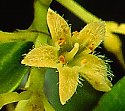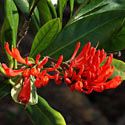|
Order:
Gentianales
Life
> eukaryotes >
Archaeoplastida >
Chloroplastida
>
Charophyta > Streptophytina > Plantae (land plants)
> Tracheophyta (vascular plants) > Euphyllophyta > Lignophyta (woody plants)
> Spermatophyta (seed plants) > Angiospermae (flowering
plants)
> Eudicotyledons > Core Eudicots > Asterids
> Euasterid I
Five families, all of which are encountered in southern Africa. Of the 1118
genera and 16637 species, 195 genera and 1213 species are native to southern
Africa, a further seven genera and 12 species are naturalised, and a further 42
genera and 111 species are cultivated in the region.
Families encountered in southern Africa
|
Apocynaceae (oleander, frangipani, periwinkle,
milkweed and asclepiad family) About 415 genera and 4555 species, native mainly to tropical and warm temperate
regions, with 104 genera and 764 species native to southern Africa, an additional
five genera and six species naturalised, and an additional 19 genera and 56 species
that are cultivated in the region. |

|
|
Gelsemiaceae Two genera and 11 species, native to South
East Asia, America and Africa but not to southern Africa. However,
Gelsemium rankinii (Yellow jessamine) (native to the southeastern USA)
is cultivated in the region. |
|
|
Gentianaceae (gentians)
About 87 genera and 1655 species, with a nearly worldwide
distribution. Ten genera and 83 species are native to southern Africa, there
are no naturalised species, and a further four genera and 11 species are
cultivated in the region. |

|
|
Loganiaceae (strychnine family) Worldwide there are 29 genera and about 600 species in this
family. The only genus native to southern Africa is
Strychnos (with 17 species native to the region) sometimes placed, together with two other genera, in a
separate family, the Strychnaceae. |
 |
|
Rubiaceae (gardenia, coffee and quinine family) A large family of 630 genera and about 10200 species found
worldwide but particularly in tropical and warm regions. Eighty genera and
349 species are native to southern Africa, an additional two genera and six
species are naturalised, and an additional 18 genera and 43 species that are
cultivated in the region. |

|
|
